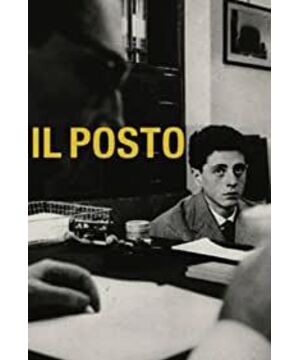In the 1950s, Italian neorealist cinema gradually declined. The 1960s was the golden age of Italian cinema, and 1960 was a watershed year. Four masters' films were released in this year, namely "Adventures" directed by Antonioni and "Tears of the Beacon Fire Mother and Daughter" directed by Desica. , "La Dolce Vita" by Fellini, "The Rocco Brothers" by Visconti. Emmanuel Olmi handed over a simple and natural work in 1961. Although it is not as innovative as his predecessors who carried on the tradition, his realism still shows his concern for the situation of the bottom under the social turmoil.
"Work" reminds me of "Rosetta" directed by the Dane brothers, which is also a realistic style. "Rosetta" is about the survival response of teenagers in the society where the rights and interests of work cannot be guaranteed, while "Work" is more description. The situation of youth in mechanical work environments. They are all standing at the bottom to adapt to the social environment, breathing helplessly in the plus-size suits under the immature faces, the seemingly tenacious desire to survive is broken with a single blow, and the flickering lamp heralds a hopeless future. This expansion of value and expression creates a sanctuary while presenting pain.
"Approximate dictation, not writing, and sketching, not fine brushwork".
The director tries to create a contrast by showing the freshness of rural youth in the city. The most obvious is the happy time when Dominic and a girl (a non-professional actor) taste coffee for the first time, but it is already a daily rest after the boss's work. The film is interspersed with the daily private life of the employees in the city, which is also boring and boring. In the narrow office, the location has become a meaningless dispute, and coffee has become a representative of the class. It shows how the social background is slow. engulfing the fresh life of one generation after another. Waiting for the expected love alone at the workers' annual meeting, the short-lived entertainment under alcohol is just an illusion, and the young Dominic gradually dimmed in the flickering lamp.
There are multiple use of depth-of-field lenses in the film, and this expression method can better achieve a kind of "continuity of reality". Taking the depth-of-field lens as the starting point, "this is no longer a matter of choosing what to see for us and a priori. Instead, the audience must use their brains to distinguish the unique dramatic spectrum of the scene in a six-sided lens of continuous reality, and the screen is the cross-section of this six-sided body.” Bazin said. . This unpretentious narrative technique also coincides with the American novel, which, like Kafka's novels, surrounds solitary individuals in a hostile society.
personal clip
View more about Il Posto reviews







